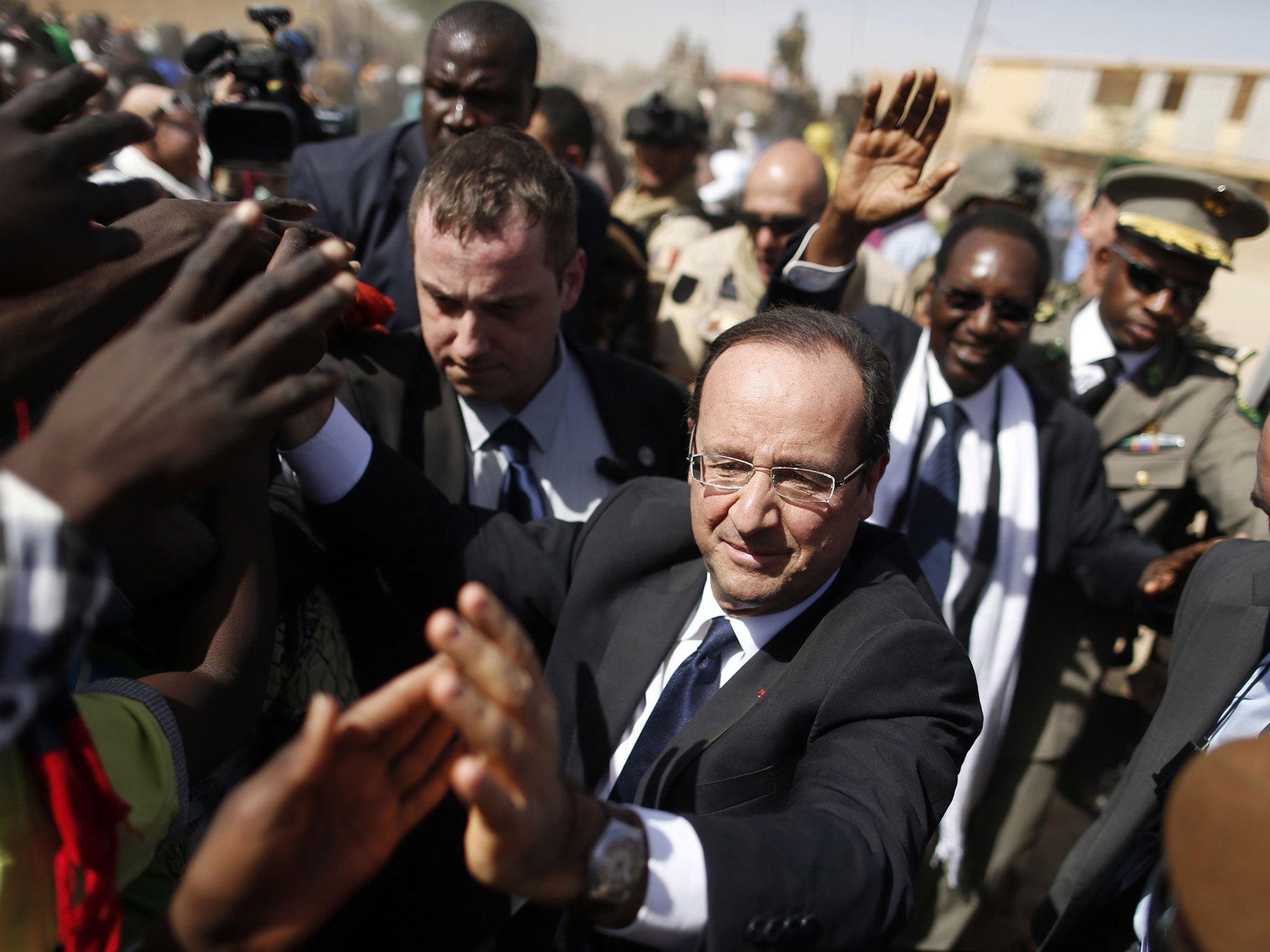Cheers for François Hollande, hero of Mali
... but it's not yet mission accomplished for the French President

Your support helps us to tell the story
From reproductive rights to climate change to Big Tech, The Independent is on the ground when the story is developing. Whether it's investigating the financials of Elon Musk's pro-Trump PAC or producing our latest documentary, 'The A Word', which shines a light on the American women fighting for reproductive rights, we know how important it is to parse out the facts from the messaging.
At such a critical moment in US history, we need reporters on the ground. Your donation allows us to keep sending journalists to speak to both sides of the story.
The Independent is trusted by Americans across the entire political spectrum. And unlike many other quality news outlets, we choose not to lock Americans out of our reporting and analysis with paywalls. We believe quality journalism should be available to everyone, paid for by those who can afford it.
Your support makes all the difference.They put on their most colourful clothes, belted out music, danced and, repeatedly and rhythmically, chanted his name. The people of Timbuktu were demonstrating that the shackles of Islamist sharia had been broken and hailing their deliverer, François Hollande .
There was no doubting the warmth and gratitude in the welcome given to the French President by Malians, on his first visit since sending in troops. But behind the scenes there are ominous signs that the swift campaign which had driven the jihadists from the territory they controlled is not the end of this war.
Over the last few days there have been discoveries of improvised explosive devices (IEDs) and the deaths of Malian soldiers from a landmine. At the same time the incendiary ethnic divisions that sparked the current turmoil have resurfaced just as the rebels are about to lose their final stronghold.
There is an unofficial stand-off at the northern town of Kidal between French troops and their Malian partners, who are not being allowed into large parts of the town due to fears they would take murderous revenge on its Tuareg residents. Instead it is Chadian soldiers who are providing the African security presence.
Tuareg fighters, armed with the looted arsenal of the Gaddafi regime which they served before it fell, had raised the flag of Azawad in Kidal. The rebellion was joined by al-Qa'ida in the Islamic Maghreb, who took over leadership and the weaponry, first sidelining and then driving out the Tuareg.
Since then the community had been under attack from both sides, with Malian troops carrying our summary executions of "terrorist suspects". Under pressure from the French, Mali's interim President, Dioncounda Traoré, has begun talks with the Tuareg separatists, a deeply unpopular move among the army who carried out a coup last year. The United Nations' special advisor on prevention of genocide, Adama Dieng, warned that human rights abuses, already prevalent, will worsen further unless urgent counter-measures are taken. "We must tell President Hollande that he has cut down the tree but still has to tear up its roots. I am deeply concerned at the risk of reprisal attacks against ethnic Tuareg and Arab civilians."
None of the unpleasantness was mentioned by officials during President Hollande's three hours and 48 minutes on the ground yesterday. In Timbuktu he visited the mosque of Djingareyber, an architectural masterpiece made out of mud 700 years ago, and the Ahmed Baba library where the jihadists had carried out their last concerted action before leaving the city – making a bonfire of priceless historic manuscripts.
The area, normally crowded, was sealed off by French armoured personnel carriers. Two dozen dignitaries were there to meet Mr Hollande's party, which included the French Foreign Minister, Laurent Fabius. "He is the man who saved Mali, it is an honour to meet him. Without him we would never have got rid of the Salafists," said Khalif Mualam Traore, a local imam. "They stopped people from thanking Allah at the end of prayers. They beat people for no reason."
Umar Sekou, a hotel owner, pointed out that ethnic divisions continued under the jihadists. "They normally punished black people most severely, not the Arabs. That's because so many of them were foreigners from places like Algeria and Tunisia. After the French came, the Arabs fled with the jihadists, their shops and businesses got looted, we found weapons in their homes."
Mr Hollande then visited the Ahmed Baba library, where he was shown the charred manuscripts, a reminder, said Irina Bokova, the director-general of Unesco who was accompanying the President, that the jihadists were intent on destroying Mali's history as well as oppressing its people.
There were tumultous greetings at the square for the French President, with French soldiers and Malian police struggling to control the surging crowd of more than 5,000. "All Mali is grateful to him, but especially the women," exclaimed Hania Kalbati, a 24-year-old teacher. "We lived in a constant night, they took away all our freedoms. We could not work, we had to cover ourselves all the time in the darkest clothes. We are glad all that is over."
But Mr Hollande told French troops at Timbuktu airport: "The conflict is not over, it would be a mistake to think that because we have restored order in towns like Gao and Timbuktu we can stop there."
Join our commenting forum
Join thought-provoking conversations, follow other Independent readers and see their replies
Comments